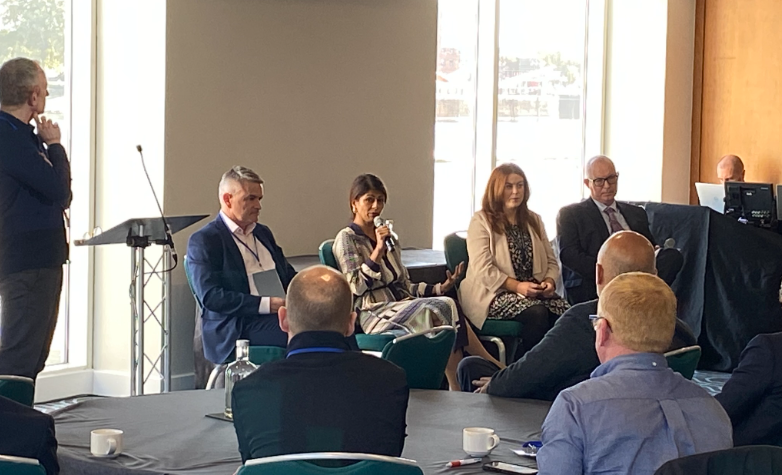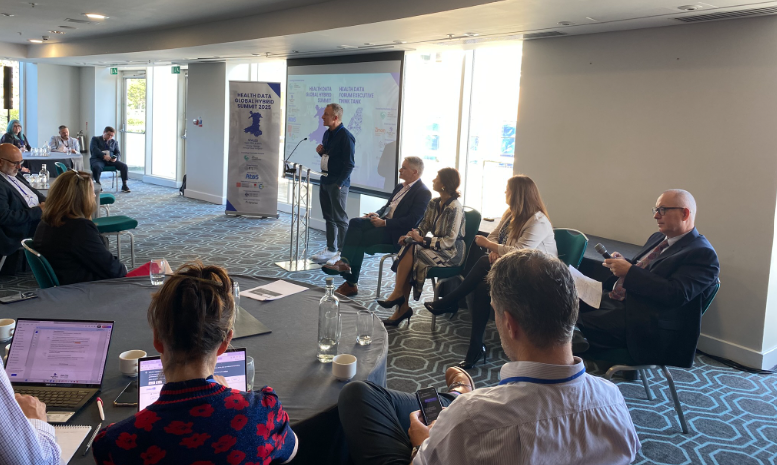A Four Nations Conversation on Ethical AI, Collaboration & Trust: Lessons from Wales 2025
When the room settled after the early-morning keynotes, the Summit shifted into something uniquely powerful: a real conversation between the UK and Ireland's most senior digital health leaders, moderated by Dan West — former CIO for Health & Social Care Northern Ireland and founding member of the UK 4 Nations Digital Leaders Forum.
The panel was not designed to list achievements. It was designed to reveal how each nation is confronting the same pressures — data fragmentation, AI hype, workforce capability, cultural resistance, and the ever-present challenge of turning ideas into system-wide reality.
What unfolded was one of the most candid, honest and grounded sessions of the day.

A Panel of "Four Nations + One" — With Challenges in Common
Dan West opened with humour and humility:
"This is the supermarket sweep of topics — UK and international collaboration, AI, ethics… I'm not entirely sure where it's going to go."
But the panel assembled was exceptional:
-
Rebecca Cook, Chief Data Officer, Digital Health & Care Wales
-
Sonia Patel, Chief Technology Officer, NHS England
-
Tom Laffan, Chief Data & Analytics Officer, Ireland
-
Paul Rice, Chief Digital Information Officer, Northern Ireland
From different jurisdictions, with different political constraints, but united by similar ambitions — and surprisingly similar obstacles.
What's Going Well? Building the Data Foundations of a Modern Health System
Dan began with an optimistic question: What progress are you proud of?
Wales: A National Data Asset and a Culture of Collaboration
Rebecca highlighted Wales' unique strength: a shared national data platform built over 20 years, including:
-
a single national results repository
-
a shared documents repository
-
early adoption of patient-centred views across organisations
-
a strategic, system-wide data strategy signed by all health boards
Wales is already seeing impact:
-
demand and capacity forecasting
-
early experimentation with Gemini LLMs
-
democratised analytics that allow clinicians to "ask questions of the data" without SQL
This is Wales at its best: small enough to act, mature enough to scale, collaborative enough to sustain momentum.
Ireland: Digital Reform at a National Scale
Tom described Ireland's shift into six regions, a new digital strategy, and a growing national Individual Health Identifier enabling system-wide linkage of data.
Ireland's breakthroughs include:
-
More than 800,000 patients now viewing hospital appointments in the national app
-
The app becoming the entry point for medicines management, personal health data, and research participation
-
a national AI strategy and an emerging AI Centre of Excellence
Ireland's challenge is one shared across Europe:
"Our data is rich, but scattered."
The work ahead is stitching it together into something citizens can use and clinicians can trust.
England: Three Big Shifts in the Largest Health System in Europe
Sonia delivered the most wide-ranging structural analysis. England is pursuing three major transformations:
1. A Person-Centred Architecture
The NHS App — with tens of millions of users — is becoming the anchor for:
-
the single patient record
-
prescription tracking (hugely popular)
-
a potential marketplace of modular, standards-based features
2. Digital Public Infrastructure
England is shifting away from "point-to-point interoperability firefighting" toward:
-
strong market-shaping powers via the Data Access legislation
-
a national standards directory
-
suppliers legally bound to comply with national interoperability rules
This is Estonia- and India-inspired — a structural reset rather than incremental fixes.
3. An Internal Operating Model for Consistency and Value
Despite billions invested in EPRs and shared care records, maturity remains uneven.
England's new goal: spend smarter, not just more, with greater national clarity on who does what.
Northern Ireland: Encompass, Trusted Research & a New Relationship with Citizens
Paul Rice described NI's biggest modernisation milestone:
"The 8th of May 2025 — our fourth and fifth trusts went live on the Encompass platform."
This is Northern Ireland's single, whole-system move to Epic, encompassing acute, community, mental health, and social care.
Other key assets include:
-
the Northern Ireland Trusted Research Environment
-
expansion of the MyCare app as a tool for appointments, public health messaging and research recruitment
Paul summarised the situation perfectly:
"We have all the right notes — maybe not yet in the right order."
But the foundations are there.
The Question Everyone Wanted Answered: What Do We Do About AI?
Helen Thomas (DHCW) asked the question on everyone's mind:
"AI is suddenly the answer to everything. How do we manage the hype without becoming harbingers of doom?"
The responses were remarkably aligned.
Tom (Ireland)
Ireland is building an AI governance framework, aligned to the EU AI Act, to:
-
evaluate proposals
-
manage risk
-
ensure responsible use
-
set expectations early with vendors
Sonia (England)
The issue isn't technology — it's risk appetite.
"If we want an AI-ready health system, we have to lift our risk tolerance. Our system's appetite for risk is extremely low."
She gave a perfect example:
Using AI for job evaluation (which includes no sensitive data) was still blocked.
The real risk?
Not modernising.
Rebecca (Wales)
AI value will be unlocked only when people can work with the data:
-
workforce skills
-
consistent standards
-
shared national architectures
-
multi-nation learning
Wales wants to partner where it matters: analytics, standards, and citizen services.
Paul (Northern Ireland)
The real challenge is cultural:
How do we keep the human element front and centre while adopting the most "ones and zeros" technology imaginable?

From Panel to Fire Side Chat: The Human Side of Transformation
After the four nations discussion, the Summit moved into a fireside chat — literally — with:
-
Helen Howson, Director of the Bevan Commission
-
Rhodri Griffiths, Innovation Adoption Director, Life Sciences Hub Wales
-
Moderated by Ifan Evans, DHCW
This was not a conversation about data pipelines.
It was about people, culture, and trust.
And it was one of the most revealing conversations of the day.
Why Innovation Is Hard (Even When the Evidence Is Strong)
Helen shared stories only someone with decades inside the system could tell.
A predictive risk tool that never launched
Years ago, she developed a predictive model to prevent hospital admissions. It was tested, validated, and ready.
It never made it to practice.
Why?
"Risk aversion. It wasn't perfect — but it wasn't going to kill anyone.
And still, the system froze."
It was the moment she nearly left public service — until she realised she needed to stay inside the system to change it.
This honesty landed deeply with the room.
The "sticky middle" problem
The Bevan Commission has supported more than 550 grassroots innovators across Wales.
Yet the same challenge persists:
-
ideas are welcomed at the top
-
celebrated at the start
-
but lost in the organisational middle
The system loves innovation
but struggles with adoption.
So Helen and the Commission built a multi-year adoption framework:
business case → stakeholder engagement → testing → system-wide embedding.
This is the real work of transformation — not inventing ideas, but embedding them.
Rhodri: "There's No Shortage of Ideas — The Issue Is Scale"
Rhodri reminded the room:
-
Wales has world-class innovators
-
Industry is eager
-
Academia is overflowing with capability
The problem is not invention.
The problem is:
-
prioritisation
-
pathway redesign
-
finding the pinch points that matter
-
and co-producing solutions with clinicians, not for them
His message:
"Match needs to solutions — don't chase shiny things."
He also stressed that Scotland, Ireland, and England often solve similar problems.
Sharing reduces duplication and accelerates adoption.
A Question for the Ages: If You Could Build a New Health System, What Would You Do?
Ifan posed the most provocative question of the Summit:
"Imagine we're creating a new health system from scratch.
What would you hard-wire into it to avoid today's problems?"
The answers were surprisingly consistent.
Rhodri
-
Invest heavily in workforce skills — from day one
-
Build a culture that embraces industry and academia as partners
-
Identify a few national strengths and "swipe with pride" from others
-
Make collaboration mandatory, not optional
Helen
Start with communities, not hospitals.
Build a system based on:
-
Resilient and empowered people
-
Integrated and prudent care
-
Sustainability — financial, environmental, social
-
A dynamic, innovative culture
And most importantly:
"If Wales can't do this, no one can."
A reminder of the country's unique size, agility, and collaborative spirit.
The Final Question: Do We Trust the Machines or the People?
Ifan closed with a pointed reflection:
"We've talked for 30 minutes, and all of it has been about people — not data, not AI.
Where should trust really sit?"
Helen shared a compelling insight:
In a recent national conversation, 72% of the Welsh public said the health system is broken.
When asked what kind of change they wanted — mild, moderate, or radical —
they overwhelmingly chose radical.
Yet leaders fear backlash.
The gap between perception and reality is striking.
Rhodri
The public will trust data-driven systems if:
-
the experts trust them
-
governance is clear
-
benefits are visible
-
risks are explained
He made a powerful analogy:
"Wales already trusts the government to make decisions about organ donation.
Compared to that, data sharing is far less invasive."
Helen
Her final thought was simple:
"We allow negative stories to dominate.
We need to tell the hopeful ones."

Watch the full recording of this session here

